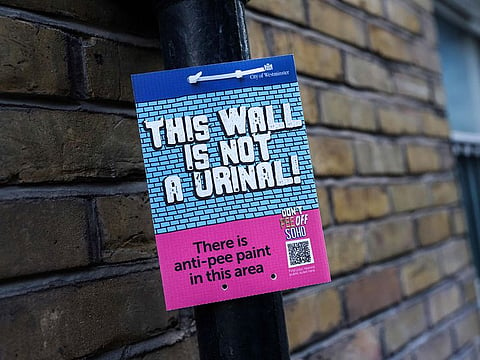London takes aim at public peeing with splash-back paint
Public urination can be a scourge in urban areas with busy nightlife worldwide

London: A central London district famous for its nightlife, but also home to thousands of residents, is trying out a novel way to tackle the persistent problem of public urination: so-called anti-pee paint.
Officials in Soho - a warren of bars, restaurants, theatres and other entertainment venues as well as apartments and houses - are treating walls at nearly a dozen problem sites with the special spray-on liquid.
The industrial strength "surface protection" creates a transparent water-repellent layer that splashes back urine when it hits, providing instant payback for offenders.
"It is very effective - the proof is in the pudding," local councillor Aicha Less told AFP, demonstrating the innovative invisible paint's splash-back ability with a bottle of water.
Westminster City Council has launched the initiative following complaints from some of Soho's approximately 3,000 residents, as well as from workers and business operators.
"Obviously pee isn't very pleasant and our residents are very upset," said Less, as a contractor finished spraying a brick wall on a quiet residential street.
"They step out their front door in the morning and you just get the stench of urine," she added. Locals are "entitled to live in a clean, safe environment".
The council, which learned about the anti-pee paint after it was previously used by another local authority and in Germany, is aiming to treat walls at 10 Soho hotspots.
Contractors erect signs at targeted sites saying they have been sprayed and the message: "This wall is not a urinal."
Westminster spends nearly #1 million ($1.24 million) annually on street cleaning, which includes hosing down peed-on sidestreets. It hopes this new strategy will lower that bill.
"We'll see what impact it makes in, say, six months' time and if there is less of a stench in the air," said Less.
'Smelly streets'
Although public urination can be a scourge in urban areas with busy nightlife worldwide, locals believe Soho is especially prone to the problem.
The 0.25-square-mile (0.6-square kilometre) district in the heart of the UK capital boasts more than 400 premises licensed to sell alcohol, around a quarter of them late into the night, according to local resident Tim Lord.
But that is accompanied by a dwindling number of permanent public toilets, said Lord, who chairs the Soho Society community group.
The area's two remaining underground toilets closed during the pandemic and are yet to reopen: there are rumours one is set to be sold and turned into a bar or other commercial venture.
"So throughout the night, you could have thousands of people who've been drinking and certainly in the summer with the closed toilets, Soho smelled," said Lord.
"If the pee paint works it will reduce the problem of smelly streets in the summer, in particular, so that's to be welcomed. We hope it works."
Westminster City Council is also looking at handing out more fines for public urination, a criminal offence that could cost offenders #50 ($62) or #80.
It has also rolled out temporary urinal stands in various Soho locations from Thursday to Sunday, when the area is busiest.
But Lord argues the declining number of permanent public toilets in Soho is "very odd" given its nightlife, part of "a uniquely English problem" in need of reversing.
"You don't have to travel very far in Europe or North America and you'll find perfectly clean, well-run public toilets," he said.
"Soho is a really important historical part of London that was laid out in the 1650s and it goes back a long way, it's a conservation area.
"We just wish our local council took care of it - it's a great place to live and a place that should be clean."



